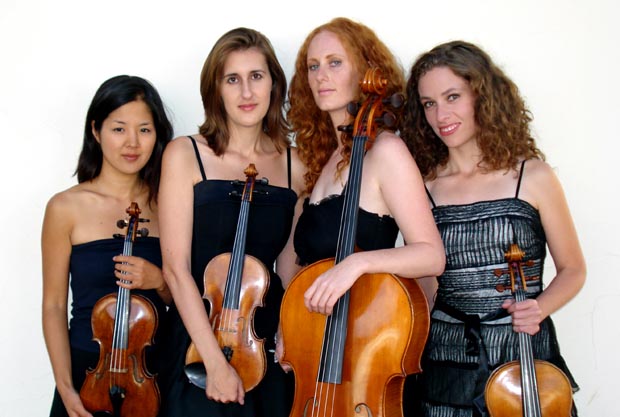
W hat I most like about being a composer is… the cash compensation. No, heh, what I like most is that you can be anybody… you can be anything at all, anything you want—through the music. No constraints, total freedom. It’s tremendously liberating.”T here is an apocalyptic ‘inclusiveness’ to this piece, a fellowship that all those affected by violence and loss (can) participate in.
— Kelly-Marie Murphy, introductory remarks, Ottawa Chamber Music Society concert, 07-MAR-2010.
O ur society is reluctant to speak about personal catastrophe—individual demolished lives and the struggles to pick up the pieces. Yet it is possible for music to speak about this—and persuasively, too.
T his piece, the second of six string quartets thus far composed by Murphy, was commissioned by CBC Radio for the International ‘Strings of the Future’ Festival and premiered at the Festival in 1999 by the Alcan String Quartet. The title derives from the old Ragovoy-Berns song of the same name, recorded by Janis Joplin in 1968.
S o far as I can tell, Murphy’s string quartet does not quote any melodies or harmonies from that song. But you can readily perceive parallels, in terms of the ethos and the gender-centric aspects of the string quartet and its popular-music namesake.
T he four-movement 15-min work begins with a slow, ethereal dialogue between the four performers, with unisons panning from left (Vn1) to right (Vc and Vla) and back again. The second movement is dominated by anxious staccato exchanges, mm ~ 120. The third movement is cinematic in its running, fleeing, desperate dash to safety. The fourth movement, mm ~ 56, begins with a solo viola statement—despondent, marooned—answered sympathetically by the cello and viola. Pianissimo high harmonics of the first violin part enter, adding a sense that the marooning will be permanent.
T he program notes by Craig Pedersen aver that, while composing this quartet was underway, Murphy was puzzled and impressed over how the heart, “a simple muscle, is taken as the seat of emotions.” Or, implicitly, puzzled and impressed over how much of our emotional state and its trajectory are muscular… physiologic… endocrinologic… beyond our capacity to predict or control.
M aybe the out-of-controlness and muscularity of fear and anger are easiest for us to comprehend.
B ut the other emotions are muscular/reflexive as well. What I mean is: if we manage somehow to cope with the injury and are not completely destroyed, then our recovery—and our preparedness to forgive and our feeling able to let go and move on—these feelings are surprising, emergent—astonishing even to the one who feels them. There is a genuine sense of discovery that is revealed in each of this piece’s movements—an emergence of ideas and emotions that maybe surprised even Murphy as she went about composing it.
T he calm that emerges by the end of the fourth movement is not one of wary acceptance or unstable endurance or any other precariousness. It is a satisfying conclusion, opening onto a spacious, open plain. The heart has miraculously survived its ordeal, with its dignity and integrity intact—surprising even its muscular self—still desiring [Life], still pumping. A new joint venture?—of both women and men?—working anew on constructive solutions together if they wish?—enabling each now to live fulfilling lives? In performance, the Cecilias fully inhabit the work, with gestures and insight that endow it with credibility, riveting the listeners’ interest. Murphy’s music tells vivid stories that empower and inspire men and women alike.
S cores and parts for Murphy’s compositions are available from the composer and from the Canadian Music Centre, 20 St. Joseph St., Toronto, ON, Canada M4Y 1J9 (info@musiccentre.ca).
K elly-Marie Murphy began her studies in composition at the University of Calgary and received her Ph.D. in composition from the University of Leeds. Murphy has subsequently held residencies at the Snowbird Institute for the Arts, Utah; Tapestry Music Theatre/Canadian Opera Company, Toronto; rESOund Festival of Contemporary Music, Edmonton; Strings of the Future International String Quartet Festival, Ottawa; Soundstreams/Encounters, Toronto; and at the Banff Centre for the Arts. Most recently, Murphy received Honorable Mention in the 2008 Barlow Prize competition.
M urphy has received numerous commissions—notably from the CBC and the Canada Council for the Arts—and has written for some of Canada’s leading performers and ensembles such as the Winnipeg, Toronto, and Vancouver Symphony Orchestras, Shauna Rolston, James Campbell, the Gryphon Trio, Borealis String Quartet, Rivka Golani, Judy Loman, and James Sommerville.
M y impressions from Sunday’s concert are that Kelly-Marie Murphy composes the kinds of music that she herself wants to listen to, pieces that are inspired by events or concepts that are deeply meaningful to her—ones that are emblematic of freedom, breaking free of constraints.
A nd, as evidenced by the energy bestowed on Murphy’s ‘Another Little Piece of My Heart’ (1999) by the members of Cecilia String Quartet in performance, Murphy’s compositions are also the kinds of music that thoughtful artists who champion new music want to play. Bravo! It was an exciting concert, one richly symbolic of this day, International Women’s Day.
T he Cecilias will next be performing Dvorak’s Piano Quintet in A major, Op.81 No.2, with Menahem Pressler at Pollack Hall at Schulich School of Music, McGill University, in Montréal on 17-MAR.

- Cecilia String Quartet website
- Kelly-Marie Murphy website
- In praise of newer music. Music Centre du Canada, 2007. [1.7MB pdf]
- Kapralova Society (women composers) website
- International Alliance for Women in Music website
- International Association of Women Philosophers website
- Music Centre du Canada
- Ottawa Chamber Music Society website
- International Women’s Day website
- SmartWomanGuides.com
No comments:
Post a Comment